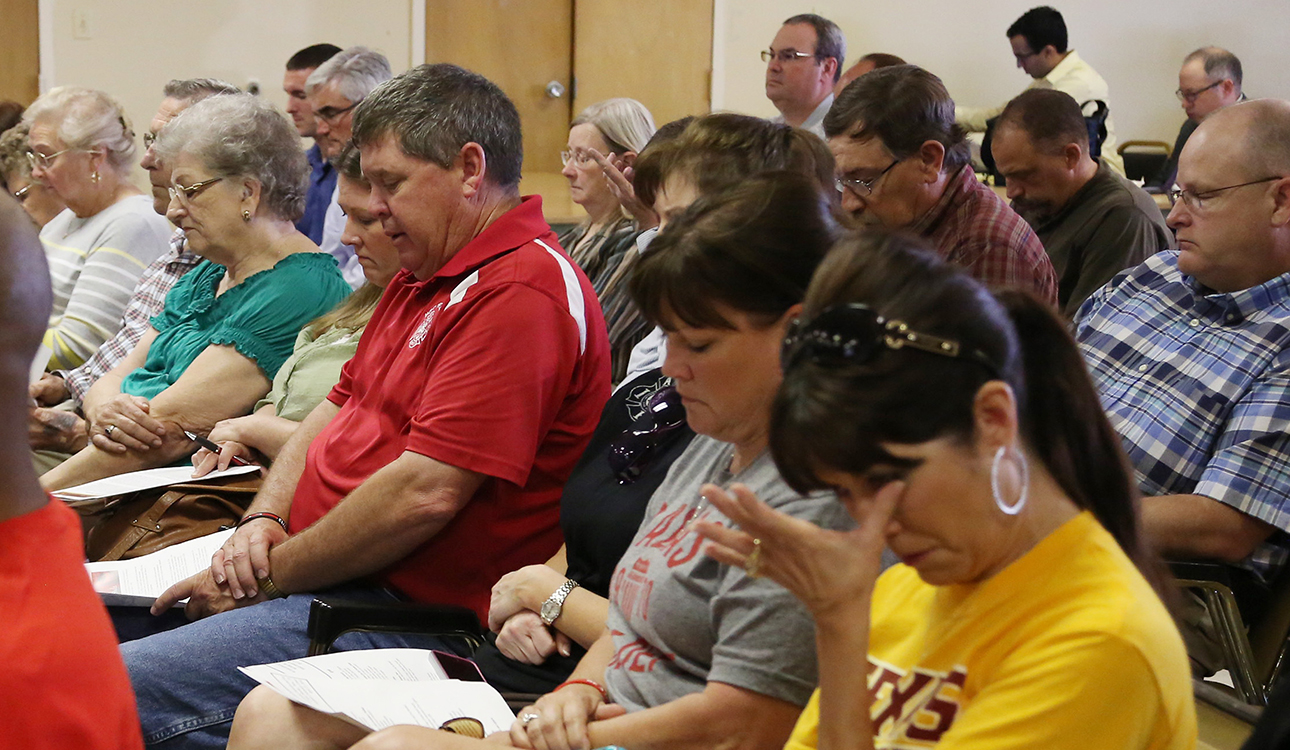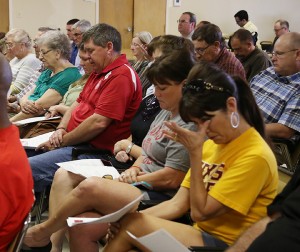

By Jordan Corona
Staff Writer
Officials from the U.S. Chemical Safety and Hazard Investigation Board said Texas can learn a thing or two in light of the tragedy in West.
“If the lessons from West do not cause any change in Texas and throughout the United States, I consider that a real tragedy,” Dr. Beth Rosenberg, a chemical safety board member said.
West citizens attended a meeting Tuesday evening at the West Community Center where officials presented some of their findings on the fertilizer plant explosion last year.
At Tuesday’s hearing, chemical board investigators, state and local officials talked a few lessons form the incident. They considered dangers of ammonium nitrate, the substance that exploded in a fire at the West Fertilizer Company. Also, the board investigators discussed a regulatory loophole impeding better emergency responses to this sort of hazmat incident.
In Texas there are no state regulations requiring communities in the vicinity of ammonium nitrate facilities to have emergency plans for accidents involving the chemical, Samuel Oyewole, a chemical safety board investigator said.
As it stands, companies dealing with the explosive substance need to adhere to few if any safety regulations for having ammonium nitrate. Part of the reason for that, chemical safety member board investigators pointed out, is because ammonium nitrate, if used for fertilizer purposes is not considered particularly explosive by federal safety standards.
The substance is not classified as an explosive material unless combined with a detonating device. Unfortunately for tragedies like the one West experienced last year, fires that happen without clear cause, are not a recognized detonating device.
The legal caveat created in the absence of local emergency planning, or the federal oversight for that matter, made for a precarious point of non-concern for the West Fertilizer Company, county and state officials, said Frank Patterson, who spoke on behalf of the McLennan County Local Emergency Planning Committee.
Patterson sat on a panel of people representing the state and local concern for optimizing an appropriate emergency response for accidents involving hazardous chemicals. The scope of their perspective included the safety of area citizenry and that of any first responders who could be hurt or killed combatting ammonium nitrate incidents.
When the fertilizer plant exploded last year, 14 people died. Of those, 12 were volunteer firefighters and EMTs.
Although the West Fertilizer Company stored the ammonium nitrate that exploded last year, those displaced and injured were not helped by local, state or federal authority’s inability to identify and the dangerous situation before it happened and prevent it.
One year from the fertilizer plant explosion that shook the central Texas town of West, people are remembering, some rebuilding and some ready to see a change.
Texas state legislators, part of the Homeland Security and Public Safety Committee met in Austin April 17 to discuss the potential for a new bill aimed at regulating safer practices for fertilizer companies across Texas.
District 79 Rep. Joe Pickett currently chairs the committee and is taking the lead drafting the bill. Pickett said most of the fertilizer facilities storing ammonium nitrate in Texas operate near small towns which, like West, have a volunteer fire department.
Texas State Fire Marshal Chris Connealy said that’s why firefighters need better training across the board.
Connealy was part of the meeting in Austin where he made recommendations on the new bill.
“This is a huge public policy issue,” he said. “If your developing public policy, and you’re rushing it, you’re going to miss your target. We’re going to fix this issue.”
That means having the state adopt a code of procedure, which would protect firefighters if and when their called to deal with developments involving ammonium nitrate. Also, he recommended fertilizer companies be required to store the chemical in fire proof structures, finished with sprinkler systems as a deterring measure.
The fire marshal’s recommendations to the state legislative committee came with a three-year implementation timeline to give fertilizer companies a chance to comply with the new standards.
“We are not trying to put ammonium nitrate facilities out of business,” Connealy said.
Last night Connealy testified as part of a panel on land use priorities—that is how zoning laws can better protect Texas communities near ammonium nitrate facilities.
“Last year we couldn’t say how many ammonium nitrate facilities there were across the state,” he said. But since last year, Connealy’s begun visiting fire officials and citizens by county to talk best practices, fire education priorities and safety concerns.
“We’ve completed 18 so far,” he said, “We’ve only got 48 more to go.”
Connealy said he would like to see funding for all firefighters to undergo better training at schools like Texas A&M’s firefighting program.
“I don’t know if regulation is the answer,” West Mayor Tommy Muska said. “But if you can enhance a product so it doesn’t blow up, that’s the answer.”
Pickett’s idea to make fertilizer companies safer means giving the State Fire Marshal power to enforce rules for the way commercial fertilizer producers store volatile chemicals, namely ammonium nitrate.
Investigators determined a fire had ignited as many as 34 tons of ammonium nitrate causing the blast at the West Fertilizer Plant last year. The State Fire Marshal is expected to release a full report on the blast later this month.
Over 1,300 facilities use ammonium nitrate across the United States, said Jerad Denton who was one of the chemical safety board investigators presenting Tuesday night.
But talk in Austin about the new regulatory ordinance over fertilizer companies coincides as members of the community have begun to consider brining fertilizer back to the local commerce team.
“This town was created by Czech farmers,” Justice of the Peace and Chair of the West Chamber of Commerce David Pareya said. “The fertilizer plant really clicked with a lot of wheels in our community.”
“The state chemist has some but not the kind of authority to keep an explosion from happening,” Pickett said.
The State Chemist has authority to enforce production regulations if a fertilizer company’s operations result in a compound that’s not chemically correct.
District 12 Rep. Kyle Kacal has ranched in Central Texas for years. He said he was concerned for the farming and ranching community in and around West, which has been pressed to find fertilizer elsewhere since the incident last year.
Kacal said farmers and ranchers tend to spend money out of town, where fertilizers are available for purchase.
A year beyond the tragedy, the city of West may re-establish a way of living, a way of being strong and resilient. While rebuilding and remembering, restoring and regrouping the community, the state may see change for protecting first responders and small towns.





